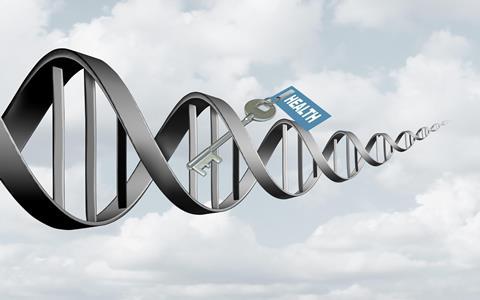Hope Virgo explores the link between genetics and mental health issues, and how advances in research are helping our understanding

I have always wondered why I developed anorexia while none of my brothers and sisters did (I am one of five). While there were others in my wider family diagnosed with mental health issues and eating disorders, I still sometimes wonder: “Why me?” And what does this all mean for my son? Will the genetic predisposition overrule the way I bring him up or can I do more to prevent him developing a mental health issue himself?
The hunt for answers
Historically, we have often blamed families if their kids develop a mental illness, or we fixate on trauma or the COVID-19 pandemic. In more recent years, the explosion of social media alongside the rise in mental health issues has put a pretty compelling case for social media ‘causing’ mental illness. It is important not to dismiss all these areas, but we shouldn’t ignore the genetics and research either. There is no single reason why someone may develop a mental illness – it can be the result of a combination of genetic, psychological, environmental, social and biological factors. Perhaps it is this lack of clarity that leaves people feeling frustrated. I know I spent many years fixated on trying to find the cause of my struggles, convinced that would help give me final closure and make me fully well.
Through my work I speak to a lot of different people who have experienced mental health issues, and a great number try to identify what has caused their mental illness – because surely then they can fix it? Many people ask: “What is the one thing we can do to prevent someone having a mental illness?” One of those people was Jenn Watson, a freelance business consultant.
Jenn, 42, was first diagnosed with depression in 2007 and generalised anxiety disorder in 2016. Following a suicide attempt in 2018, Jenn had more assessments done and was diagnosed with fibromyalgia in 2017 and social anxiety in 2020.
Jenn told me that there were several things that had impacted her mental health: “My father’s younger brother struggled with his mental health for many years, as did my father. In 2007 I was still relatively new to the UK, having moved back from South Africa in 2005. My father was abusive, my mum was having physical issues that later we found out to be rheumatoid arthritis among other things, my brother was being assessed for ASD (Autism Spectrum Disorder) and my sister was planning her wedding. It was a lot for me to deal with at that time. My suicide attempt in 2018 was triggered after many years of being the support for the family. I had reached the end of myself and just wanted to go home. God had other ideas though.”
Even with clarity about many of the contributing factors in her own mental health journey, Jenn is still keen to see where genetics may play a part: “The brain is fascinating and the link between the brain and the mind is amazing. We’ve heard the stories of people learning to walk again and rewiring the brain. A genetic link to mental illness is not as absurd as some may think. When I think about how God has created everything under the sun and how miraculous the human body is I am not surprised that we have discovered these genetic links.”
Professor Gerome Breen, who is a professor of psychiatric genetics specialising in mood disorders, psychosis and eating disorders, told me: “From what we know of the genetics of mental illness, most of the disorders are in the range of 30 to 85 per cent of being inherited. Eating disorders broadly fall into the range around 40 to 70 per cent, with more severe eating disorders being more heritable. However genetics is not destiny.”
Finding out more about the genetics behind mental illness has helped me not only in my campaign work but personally too. Mental illness is still massively stigmatised but the more we find out about the science behind it, perhaps people will become more accepting.
Trusting God in the darkness
As a Christian, I was interested to understand more about the role genetics plays in mental ill health because surely God doesn’t want anyone to go through the pain that is often accompanied by mental illness. I caught up with Ruthi Banbury Gibbons to help unpack this. Ruthi, 32, is a priest in the Church of England and both she and her partner have struggled with mental illnesses. She told me: “Both of us have had it as a constant background noise since being teenagers. Stress at work gives us bigger flare-ups and for me lots of change is often a trigger for depression to rear its ugly head.
“It was a relief for me to hear it can be genetic because I thought I was on my own with it all, although that didn’t make a difference as to how I felt about God. I don’t feel like God designed me wrong or anything like that.”
I love what Ruthi says about God not creating her wrong, as I know so many people who have had to unpack these feelings of feeling wrong in who they are and the additional shame that contributes to mental illness for so many. Personally, I have had moments of sheer frustration looking at myself, my life and thinking: “Why can’t I just be like others? Why am I wrong?”
Genetics is not destiny
Ruthi went on to explain: “It’s blooming hard to [trust God when you feel wrong]. And there are times that I feel totally blocked off from God. There was one night where I felt completely overwhelmed by darkness and felt totally abandoned by God. But Psalm 88 was helpful because it is written by someone who is also in the pit of despair. It’s good to know you’re not alone. I get more frustrated with God and want to know when there will be a way out. But God has held me through darkness before so I trust he will hold me again.”
I can relate so much to the struggle to trust in God in those hard days, weeks and months. When you are desperate to be well, yet things aren’t changing, the frustration is so intense. Some of the keys I have found that help me include: journalling through the hard times, asking God to give me understanding about why I feel a certain way, alongside looking at the evidence and lack of evidence that backs up or refutes those feelings, and flooding myself with worship music.
Illuminating research
It is the practical mechanisms mentioned above, combined with therapy and nutrition, which have helped me get to where I am in my own recovery. And I certainly feel that ongoing research brings a sense of optimism about the future in treating mental illness.
Professor Gerome Breen said: “In [the area of] depression researchers have been able to gather data from hundreds of thousands of participants. They literally have hundreds of genetic findings that people around the world are following up for new therapeutics. In the small studies of up to 20,000 eating disorder participants that we’ve been able to carry out, we’ve already seen new biology has emerged. The idea that anorexia is both a metabolic and psychiatric illness has been hugely impactful with clinicians and others, citing the finding in terms of how it’s influencing their thinking of what causes these disorders. We hope as we carry out larger studies to be able to illuminate sufficient new biology that one or more therapeutic mechanisms can be developed to either find a reliable blood-based biomarker that can predict treatment response or to find one or more druggable mechanisms whereby medication can be developed.”
So what next? Perhaps it will be in our lifetime that we have some amazing breakthroughs around mental illness and research, but for now let’s work to create a more accepting society for those who are struggling.
UK Eating Disorders Genetics Initiative
Professor Gerome Breen co-leads the largest consortium looking at the genetics of eating disorders, and he runs a study called EDGI-UK, the UK Eating Disorders Genetics Initiative. To find out more about EDGI-UK you can go to their website, edgiuk.org where you can get a DNA saliva kit to get involved in the research.

































No comments yet